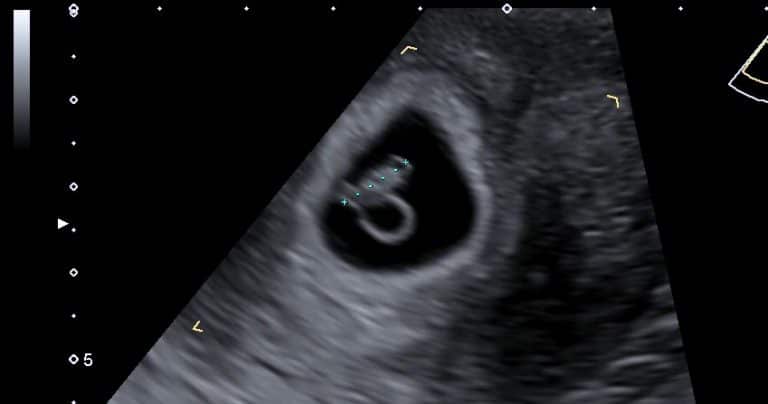Pregnancy Ultrasound Scan
A pregnancy ultrasound is the most widely used medical imaging method for viewing the foetus during pregnancy. In the UK the NHS, unless there are pregnancy complications, offers two baby scans one in the first trimester called dating scan and one at 20 weeks called anomaly scan. These routine examinations are performed to assess and monitor the health of the foetus and mother.
Ultrasound examinations provide parents with a valuable opportunity to view and hear the heartbeat of the foetus, bond with the unborn baby, and capture images to share with family and friends.
How do ultrasounds work?
Ultrasound works by transmits silent sound waves through the body tissues to create an image of your baby in your womb, which you and your partner will be able to see on a TV/computer screen.
While the scan is been carried out, the sonographer will usually explain what she/he is looking at, and you may be given a black and white print of the image to take home with you, as well as a written or digital ultrasound report.
Some units even give you the option to get your baby scan recorded on a videotape, which you can buy.
You can read more information about ultrasound scans.
What the scan can tell you about your pregnancy?
Seeing your baby moving around throughout the scan can be extremely enjoyable and reassuring to see your baby is developing normally and also to monitor its growth along with well-being.
The scan will show the exact position of your baby and the placenta.
Will evaluate for any causes of bleeding in early pregnancy, along with excluding an ectopic pregnancy.
Identify foetal abnormalities, especially of the head or spine, such as the structural/developmental defects spina bifida and hydrocephalus, or to specify this risk of this chromosomal disorder Down's syndrome.
Show your baby moving and allow you to hear his/her heartbeat and see foetal movements. The scan will also evaluate the amniotic fluid volume and blood flow to the womb along the umbilical cord.
Where possible will allow you to find out the sex of your baby at the 20-week scan.
Do ultrasound scans harm the baby?
Diagnostic ultrasound has been used during pregnancy for more than 20 years and is generally considered safe when used appropriately and by trained operators.
Ultrasound energy has the potential to produce biological effects on the body such as increase the temperature of tissues and cause cavitations. The lowest amount of ultrasound energy that provides an accurate assessment should be therefore used.
Foetal ultrasound also has limitations. A foetal ultrasound, for example, might not detect all birth defects or might incorrectly suggest a birth defect is present when it's not.
Do ultrasound scans hurt?
Ultrasound scans are completely painless, and also to date, there is no medical evidence to prove that they can harm either a pregnant woman or her unborn baby.
3D and 4D Scans
A classic ultrasound picture is a 2d image. These days 3D and 4D images are also available. Three-dimensional (3D) ultrasound allows the visualization of some facial features and possibly other parts such as fingers and toes of the foetus. Four-dimensional (4D) ultrasound is 3D ultrasound but live.
Although ultrasound is considered to be safe with very low risks, the royal college of the gynaecologists, as well as the British Medical Ultrasound, do not recommend 3D and 4D scans for souvenir purposes.
You can read more about 2D and 3D pregnancy ultrasounds.
How do you prepare for a pregnancy scan?
Preparation for a pregnancy scan will depend on your gestation age.
You might be asked to drink water before you ask if your scan is in the first trimester. If your urinary bladder is full, it will create an acoustic window from your abdomen to your uterus.
No preparation will be necessary for the later stages of pregnancy.
During the procedure
During a transabdominal foetal ultrasound, you will lie back on an exam table and expose your lower abdomen. Your sonographer will apply ultrasound gel to your abdomen. This will help the transducer to slide and improve the contact and transmission of sound through your skin.
The probe will be moved back and forth over your abdomen. The sound waves reflected off your and baby tissues will be converted into images on a monitor.
The sonographer will do measurements and check the baby's anatomy. Depending on the stage of your pregnancy you might be able to see the baby's face, hands and toes as well as other organs.
If you're having a transvaginal ultrasound, however, you'll be asked to remove your trousers and underwear and a towel will be provided to cover.
You will lie back on the couch, and you might have to place your feet in stirrups or on a chair at the end of the couch. The transvaginal transducer will be covered with a probe cover and lubricating gel.
The probe will be placed in your vagina.
When can I have an ultrasound scan? When can you see the baby's heartbeat?
An ultrasound scan will be able to detect a pregnancy and a heartbeat in normal pregnancy at around 6 weeks, but this varies a great deal and isn't usually advised. All too often, a scan at 6 weeks shows very little or nothing, even in a perfectly developing pregnancy, whereas waiting a week or 10 days will make the findings much clearer.
Most Popular Pregnancy Scans
How much do private ultrasounds cost?
There's no simple answer.
The cost of private pregnancy ultrasounds depends on the location of the clinic and other variable factors. In our London ultrasound clinic pregnancy scan prices start from £109.
Can you see a 2-week pregnancy on ultrasound?
No, you can't.
At 2 weeks gestation, there are hardly any visual changes on ultrasound.
Can you see a baby at 5 weeks on an ultrasound?
You won't be able to see a baby at 5 weeks scan. We recommended 6+ weeks for your first baby scan.
What does an 8-week ultrasound look like?
At 8 weeks the baby should be clearly visible. You can read more about the 8-week scan.
What does a 6-week ultrasound look like
At 6 week ultrasound in most cases, you should be able to see the gestation sac and possibly the foetal pole. Read more about the 6-week pregnancy scan.
Can I pay for an ultrasound?
Yes, you can pay for a private ultrasound scan. International Ultrasound Services offers access to private medical scans for people with or without private medical insurance.
If you have private medical insurance, your private scan might be covered. Please confirm with your medical insurance provider before booking your scan.
Can you self refer for ultrasound scanning in London?
A prescription is not required for a private ultrasound in our clinic in London. You can self refer for a scan, and you can book your appointment yourself using our online diary.
Content Information
We review all clinical content annually to ensure accuracy. If you notice any outdated information, please contact us at info@iuslondon.co.uk.
About the Author:

Yianni is a highly experienced sonographer with over 21 years in diagnostic imaging. He holds a Postgraduate Certificate in Medical Ultrasound from London South Bank University and is registered with the Health and Care Professions Council (HCPC: RA38415). Currently working at Barts Health NHS Trust, Yianni specialises in abdominal, gynaecological, and obstetric ultrasound. He is a member of the British Medical Ultrasound Society (BMUS), Society of Radiographers (SoR) and regularly contributes to sonographer and junior radiologists training programs.







